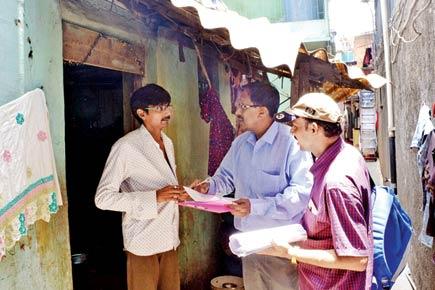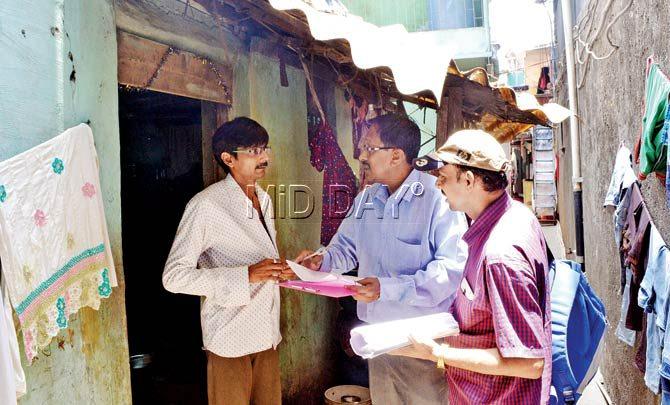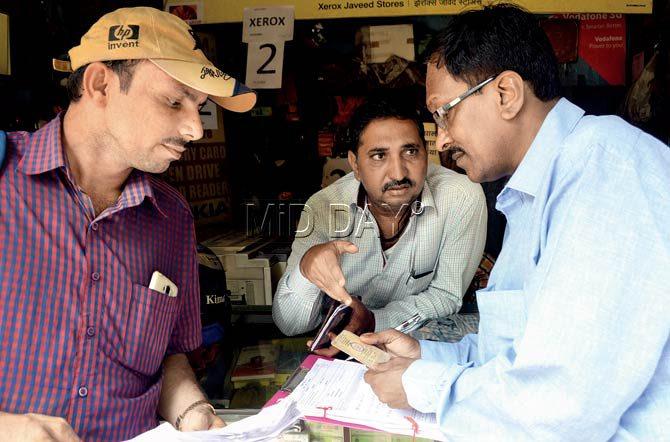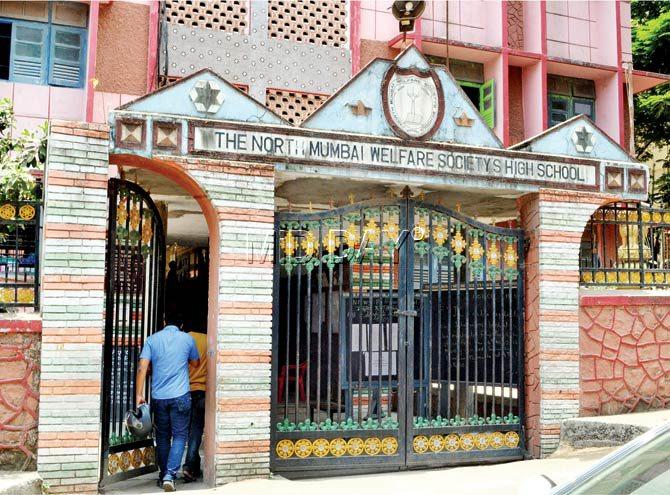North Bombay Welfare Society’s school running without lab assistant and peon, even during Board exams, because Collector’s office won’t relieve them from election duty — originally, a twice-a-week task

What should have been a once-a-week or a twice-a-week job for Narayan Subramaniam and Vishnu Sharma has turned out to be an entire year’s labour. And, there’s still no end in sight.

A resident of Narayan Nagar in Ghatkopar West interacts with (centre) lab assistant Narayan Subramaniam and (right) peon Vishnu Sharma. While on election duty, the two have covered homes between Powai and Kurla since May 2015, having to skip school duty entirely. Pics/Datta Kumbhar
ADVERTISEMENT
On May 28, 2015, Subramaniam (54) and Sharma (42) — who work as lab assistant and peon respectively, at Ghatkopar’s North Bombay Welfare Society’s High School — were deputed as field officers after a letter was received by the school by the district election officer-168 of the Chandivli Vidhansabha Matadar Sangh, asking for them specifically. The school headmaster Ashok Kumar’s four letters since then to the said officer and also the previous Suburban Collector Shekhar Channe (who held the office till April 2016) has met with no response. In their absence, the government-aided school’s functioning has been affected since it can’t hire staff to replace them.

Often, Narayan Subramaniam (Right) and Vishnu Sharma (left) end up meeting disgruntled residents such as Sayyad Mohammed Kamar (centre). He shouted at the two saying, “I have been staying in this area for years. Out of 18 members of my family, including relatives, all of whom stay close by, only my name is missing from the electoral list. I have not been able to vote for the last two elections due to this. Why am I being deprived of my right to vote?” The duo could only ask him to approach the local election office, assuring him of all assistance required
In the meanwhile, while Subramaniam and Sharma continue their work as booth level officers (BLOs) without training or briefing, they have to travel door-to-door between Powai and Kurla (the assembly constituency they have been assigned) without any reimbursement for transport, food (most of their meals have to be taken on the road) or even the honorarium of Rs 6,000 per year paid to such staff on either a yearly or half-yearly basis.

Last May, Ashok Kumar, the headmaster of Ghatkopar’s North Bombay Welfare Society’s High School, received a letter from district election officer, 168 Chandivli, asking that Subramaniam and Sharma report for electoral duty. The letter said the institute would be liable for punishment under the Representation Of People Act 1951 if there was non-compliance
“We were asked to submit a cancelled cheque, which we did a couple of weeks ago, but we are not sure if anything will come into our bank accounts. We had to also spend for the revenue stamp of Re 1 and even the lamination charges for our identity cards. We do not even get a complementary tea when we visit the election office for submission,” shrugged Subramaniam.
Not an easy job
A circular by Chief Secretary Swadheen Kshatriya dated March 11, 2015, states that as per directives of the Election Commission of India, between March 1, 2015 and July 31, 2015, work would begin on the National Electoral Rolls Purification and Authentication Programme (NERPAP) [purification signifies the updation of names on the list i.e. updating names, photographs and addresses]. BLOs would be appointed for this by government offices, and would have to do this work in addition to the work they do at their parent establishments. However, the circular clarifies that the BLOs can’t be made to work beyond the stipulated time which ranges from 48 days and 96 days i.e. once a week or twice a week. Whoever appointed Subramaniam and Sharma (and most likely a horde of other BLOs in the city), doesn’t seem to have understood this.
“Our first task when we reported to the Vidhyavihar electoral office was to enrol first-time voters. We had to check their Aadhaar cards and addresses and register their names in the electoral list. This was a door-to-door exercise and went on from June to September. On an average, we’d register 30-40 new applicants every day. Some days, the number would near 100,” said Subramaniam.
After September, they were tasked with checking the residential voters’ list. Each member of the team — it was initially 150 — was given four electoral booklets each, with details of more than 800 voters. These had to be verified with the given address, photograph and contact details had to be taken for reference. Besides ensuring the missing photos were submitted, names of those who had died or moved from that residence had to be deleted and thus stated in the list.
“No specific training was provided to us. All we were given was the area to work in. Usually, these were slums where it is difficult to locate and identify each address, as most are incomplete. We have to go showing photographs to people and not everyone wants to help,” said Subramaniam.
Sharma added that often — a previous BLOs botched-up work — either left incomplete due to reassignment, callousness or simply because there’s no supervisor to ensure that a thorough job has been done — leaves residents irked. “When we revisit such slumdwellers, they start shouting and yelling at us. Even pasting the election commission notice is a challenge as the glue provided by the government does not even stick a paper. We have to buy our own,” he said.
Both say that while some staffers — from the Employees Provident Fund (EPF) and other agencies — were sent back to their parent organisation after their office requested them back, their own school’s letters were ignored. There’s no attendance system either. “We are expected to complete the booklet in a week or fortnight. We do what we can and leave the rest blank,” Sharma said.
The school needs them
Kumar, the school’s headmaster, said, Subramaniam is the only school lab assistant and has to manage all three laboratories (physics, chemistry and biology). “His absence was felt while conducting the practical sessions for Board exams of Std X. The teaching faculty had to work extra hours to ensure that the students’ practical exams were not affected.”
Sharma, he said, is the primary section peon and among the three to help the 17 teaching staff with the administering of 1103 students. “There are two clerical staff posts. Both have been vacant for six years for want of civic approval and of the four sanctioned posts of peons, only three are on rolls including Sharma,” he added.
Kumar added that while the norm is that the election office requests the organistion to send a certain number of staff, who are then nominated by the head of department, in this case Subramiam and Sharma were specifically asked for specifically. The letter, by district election officer-168 Chandivli on May 19, 2015, said the institute would be liable for punishment under the Representation Of People Act, 1951, if there was non-compliance.
“The school management is not against putting the staff for doing election work, but if the staff gets engaged for an entire academic year, then it is surely a problem for running the school,” said a senior member of the school administration.
An official from the suburban collector’s office at Bandra said, “We have received the letter from the said school and the same will be put up before the new suburban collector for necessary action.”
Not done as per book
A senior official from the election department at Mantralaya said that the state requires 88,000 staff across Maharashtra for conducting electoral work, which is a continuous process. “However, we only have 47,000 staff at present most of them from the revenue department and around 8,000 staff, including non teaching school staff, BMC, sales tax, BEST and other central/state government establishments,” he said.
The officer clarified that an honorarium of R6,000 per year is paid to the staff on either half-yearly or yearly basis for the work. About the case of Subramiam and Sharma, he said, “We will look into this case, this should not be happening at all.”
State Chief Secretary, Swadheen Kshatriya said, “We will set up a mechanism to ensure that BLOs are made to work only for a specified period. Instructions for implementing the same will be passed on to collectors across the state at the earliest. BLOs cannot be used throughout the year; it will cause an adverse affect.”
Nitin Gadre, Chief Electoral Officer of Maharashtra, added that the People Representation Act of 1951 does not expect the election department to have their own field staff, and therefore, it has to depend on staff from other government institutions. However, he clarified that overusing of BLO staff for electoral work is not accepted and will be looked into.
RTI activist and former Central Information Commissioner Shailesh Gandhi, said, “Especially, staffers at education institutes should not be taken away for such a long duration for electoral work. Asking for staff without consent of the institution is illegal use of power. Powers are given to officials are subject to rules and regulations, and no one has unlimited powers, not even the President and the prime minister.”
 Subscribe today by clicking the link and stay updated with the latest news!" Click here!
Subscribe today by clicking the link and stay updated with the latest news!" Click here!







